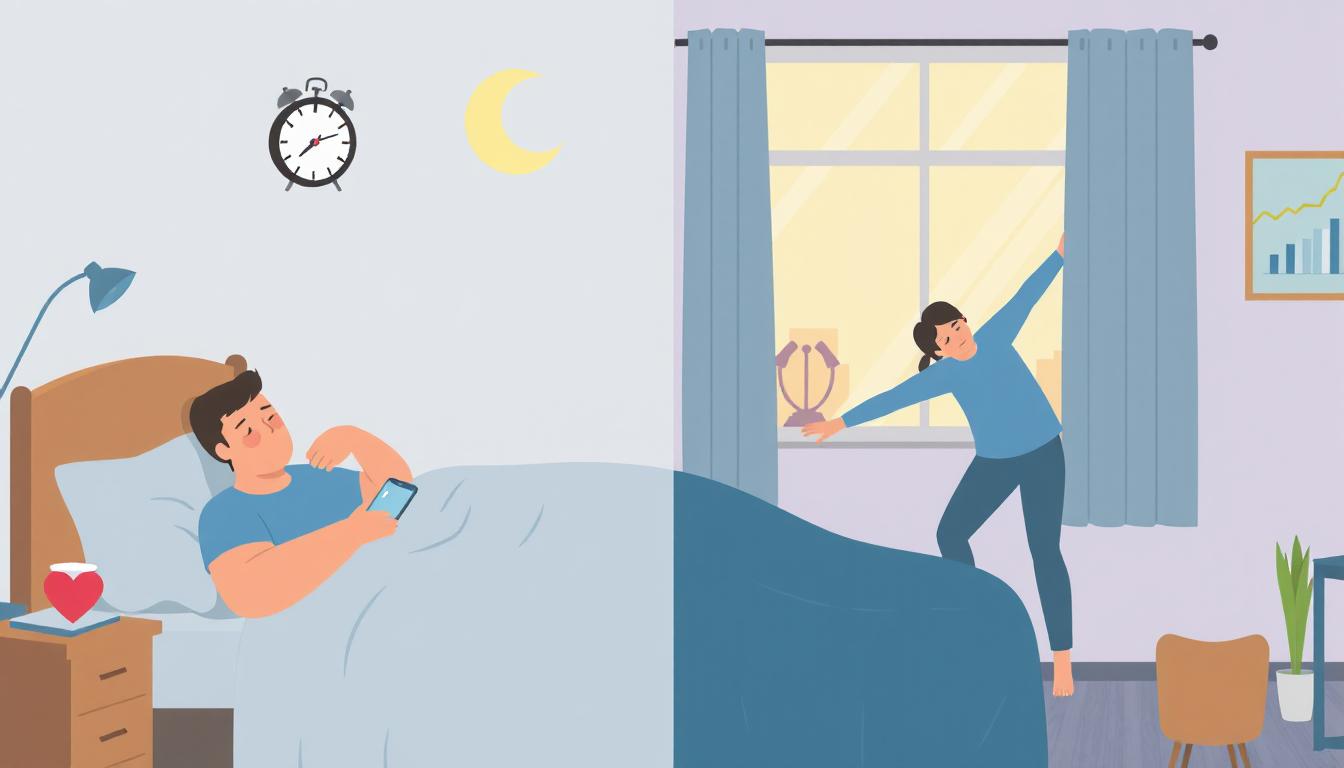The Complex Link Between Sleep and Weight: An Introduction
For many people, the relationship between a good night’s rest and a healthy weight might not seem immediately obvious. Yet, the science is clear: sleep and body weight are deeply intertwined, often in ways more complex than commonly understood. When sleep becomes disrupted—whether by stress, lifestyle, or health conditions—it can trigger a domino effect that leads to weight gain. On the flip side, carrying excess weight can interfere with sleep quality, setting up a self-reinforcing cycle that’s tough to break. It’s a loop that affects not just the body but also the mind and even broader aspects of society.
In this article, we’ll unravel how sleep deprivation and obesity feed off one another, why this cycle is so hard to escape, and what practical strategies can help people reclaim both their rest and their health. Let’s dig into this modern dilemma, blending scientific insight with real-world advice for everyday living.
How Poor Sleep Alters Body Chemistry and Fuels Weight Gain
Picture this: you toss and turn all night, and by morning, you’re groggy, irritable, and oddly hungry. There’s a reason for that. When your body doesn’t get enough rest, it undergoes hormonal changes that directly impact how you eat and burn calories. Two key players—ghrelin and leptin—are at the heart of this process.
- Ghrelin: Often called the “hunger hormone,” it spikes when you lack sleep, ramping up your appetite.
- Leptin: This hormone signals fullness, but with too little sleep, its levels drop, making you feel less satisfied after eating.
That’s not all. Sleep deprivation throws off your body’s ability to regulate blood sugar, increasing cravings for high-calorie, sugary foods. It also saps your willpower and decision-making abilities, making it much harder to resist junk food or stick to a healthy eating plan. Over time, these small shifts add up, nudging the scale in the wrong direction.
Consider the typical tired parent, working long hours and grabbing fast food out of convenience. Or the college student pulling all-nighters and reaching for chips and soda to stay awake. These scenarios aren’t just common—they’re recipes for gradual, creeping weight gain.
Obesity’s Disruptive Impact on Sleep Quality
If you think the story ends with poor sleep causing weight gain, think again. Excess weight—especially around the neck and abdomen—can wreak havoc on your ability to get restful, uninterrupted sleep. Two major sleep problems are especially common among those struggling with obesity:
- Obstructive Sleep Apnea (OSA): Fat deposits around the throat can block airways, leading to repeated pauses in breathing and frequent awakenings throughout the night.
- Insomnia: While less direct, the inflammation and metabolic disruptions linked with obesity can trigger difficulty falling or staying asleep.
People with OSA often wake up feeling unrefreshed, regardless of how long they were in bed. Daytime sleepiness, headaches, and mood swings are common side effects. Some individuals may not even realize their sleep is fragmented, chalking up their fatigue to stress or a busy lifestyle.
In more severe cases, night after night of poor sleep becomes the norm. The body tries to compensate with extra calories for energy, further fueling the cycle of weight gain and sleep loss.
The Vicious Cycle: Why It’s So Hard to Break
So what keeps this cycle going? It’s more than just biology—habits and environment play huge roles. When someone is exhausted, their drive for physical activity plummets. After all, who wants to hit the gym or go for a walk when they’re running on empty?
Plus, modern life is loaded with sleep traps: blue light from screens, 24/7 work demands, processed convenience food, and chronic stress. These factors make both restful sleep and healthy eating feel out of reach.
- Lack of energy leads to less movement.
- Less movement means fewer calories burned.
- Poor sleep triggers cravings for high-carb, high-fat foods.
- Weight gain makes sleep even more elusive.
It’s a classic chicken-and-egg problem. For many, just thinking about making changes can feel overwhelming—especially when quick fixes are endlessly advertised, but rarely effective in the long run.
Breaking free requires addressing both sleep and weight together, not just one or the other.
Personal and Societal Consequences of the Cycle
The impacts of this sleep-weight spiral stretch far beyond the bathroom scale or an individual’s energy level. Chronic sleep deprivation tied to obesity can drag down nearly every part of life.
- Physical Health Risks:
- Elevated risk of heart disease, diabetes, and high blood pressure
- Weakened immune function, making illnesses more frequent
- Increased risk of accidents due to drowsiness or impaired reaction time
- Mental and Emotional Toll:
- Higher rates of anxiety, depression, and irritability
- Difficulty concentrating and memory lapses
- Workplace and Economic Effects:
- Lower productivity and more sick days
- Higher healthcare costs for families and employers
- Increased risk of workplace accidents
For society as a whole, the ripple effect is staggering. More people struggle to perform at their best, families face higher medical bills, and communities see rising rates of chronic illness. Productivity drops, and so does overall well-being.
In short, when sleep and body weight spiral out of control, everyone pays the price—physically, mentally, and economically.
Strategies to Disrupt the Cycle: Practical Steps Forward
The good news? This vicious cycle is not set in stone. Small, realistic changes can make a major difference—especially when approached with patience and self-compassion. Here are some research-backed strategies for getting things turned around:
- Prioritize Sleep Hygiene:
- Set consistent bedtimes and wake-up times—even on weekends.
- Keep your bedroom cool, dark, and quiet.
- Limit screen time at least an hour before bed; blue light disrupts melatonin production.
- Establish a calming wind-down routine (reading, gentle stretching, or meditation).
- Adopt Mindful Eating Habits:
- Eat meals at regular times, avoiding late-night snacking.
- Choose high-fiber, protein-rich foods that keep you fuller, longer.
- Pay attention to true hunger cues versus emotional eating.
- Get Moving—Gently at First:
- Short walks or light stretching can boost mood and promote better sleep.
- Find activities you enjoy, making movement a reward rather than a chore.
- Manage Stress:
- Practice deep breathing, journaling, or connect with supportive friends.
- Consider mindfulness or yoga—both have been shown to improve sleep and weight control.
- Seek Professional Help When Needed:
- If sleep issues persist, consult a sleep specialist or primary care doctor.
- Registered dietitians or therapists can guide sustainable weight management.
Remember, improvement can take time. Setbacks happen. But even modest progress—like adding 30 more minutes of sleep or swapping one snack for a healthier option—can spark positive change.
Breaking the Cycle: Stories of Change and Hope
Let’s step away from the studies for a moment and consider real


